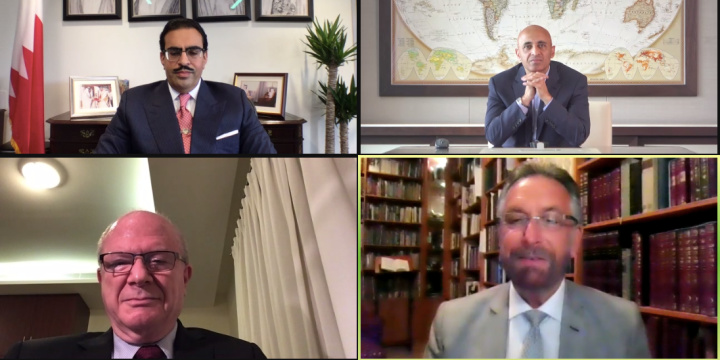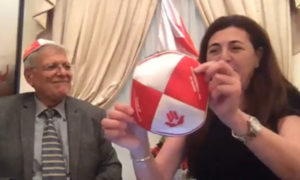
(From top left, clockwise) Ambassador Sh. Abdulla Rashed Al Khalifa, Ambassador Yousef Al Otaiba, AJC International Director of Interreligious Affairs Rabbi David Rosen and former Ambassador Marc Sievers. Photo: Screenshot.
The Association of Gulf Jewish Communities (AGJC) hosted a virtual webinar on Thursday about the importance of religious tolerance and coexistence between the Muslim and Jewish communities.
The Zoom event was in celebration of the Jewish holiday of Lag B’Omer, which begins Thursday evening, and Iftar, the evening meal with which Muslims end their daily Ramadan fast. The month-long Ramadan ends May 12.
Rabbi David Rosen, international director of Interreligious Affairs at the American Jewish Committee, moderated a panel discussion that featured Bahrain’s Ambassador to the United States Sheikh Abdulla Rashed Al Khalifa, the United Arab Emirates’ Ambassador to the United States Yousef Al Otaiba and former Ambassador of the United States to the Sultanate of Oman Marc Sievers.
AGJC is the umbrella organization for the Jewish communities of the Gulf Cooperation Council (GCC) countries that aim to enhance Jewish life in the region. It runs under the leadership of Rabbi Dr. Elie Abadie, based in Dubai, and Bahrain-based president Ebrahim Dawood Nonoo.
Related coverage

March 5, 2021 1:31 pm
“Both Sefirat Ha’omer and Ramadan share a common theme as they are a time for reflection,” Rabbi Abadie told The Algemeiner by email. “As we celebrate the Lag B’Omer holiday and Iftar dinner together as the AGJC with our Muslim neighbors, it’s a time for us to reflect on where the region is today and the role that interfaith diplomacy has played in getting us here.”
The Thursday event began with Abadie explaining the holiday of Lag B’Omer, followed by Muslim peace activist Loay Alshareef, who talked about Ramadan.
Abadie told viewers that “from the difficult times to the happier times … I think the lesson is first and foremost accepting each other’s differences [and] tolerating each others opinions by respecting them, and recognizing we are all children of one God, one supreme being [and] one father. We are all members of the same family and that is certainly a cause to celebrate.”
Alshareef, live from Abu Dhabi, said, “commonalities between the Jews and the Muslims are numerous. If we only make a consensus on 10 percent of what we have in common, we could overall all challenges we have to have a brighter future for our societies.”
During the panel discussion, Al Otaiba called on the global community to not let religion be politicized and become “a wedge issue that divides people.” He stated, “It should not be taboo to make peace with Israel … while we may have some challenges on politics or with countries — that is not a religious issue; it is not an ideological issue. Those two things should be kept very separate.”
He later discussed the UAE’s Abraham House — a facility that will hold a church, mosque and synagogue side-by-side — and said the building is roughly two years away from completion. He also applauded the Abraham Accords agreement between Israel, the UAE, Bahrain and Morocco for helping to normalize Jewish-Muslim relations.
While Sievers talked about America’s “long-standing” policy of advocating for religious self-determination and dialogue between religions, since the International Religious Freedom Act of 1998, Al Khalifa addressed the history of the Jewish community in Bahrain. The latter added that in Bahrain, “we have always been a country that values peace and the inherent prosperity that comes with the harmony of all people, regardless of their faith. The whole notion of peaceful coexistence is enshrined within the Bahraini DNA and it will be there for many years to come as well.”
Related posts:
Views: 0
 RSS Feed
RSS Feed

















 April 30th, 2021
April 30th, 2021  Awake Goy
Awake Goy  Posted in
Posted in  Tags:
Tags: 
















